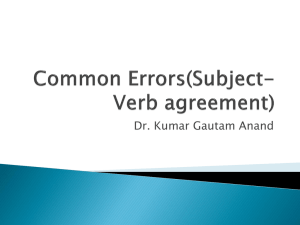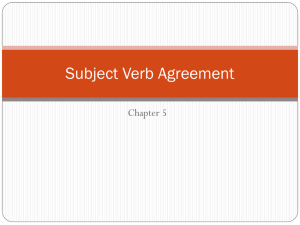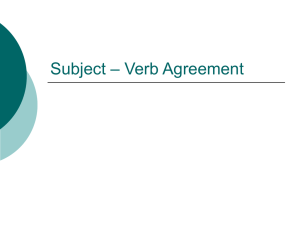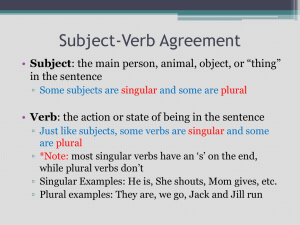Read my presentation
advertisement
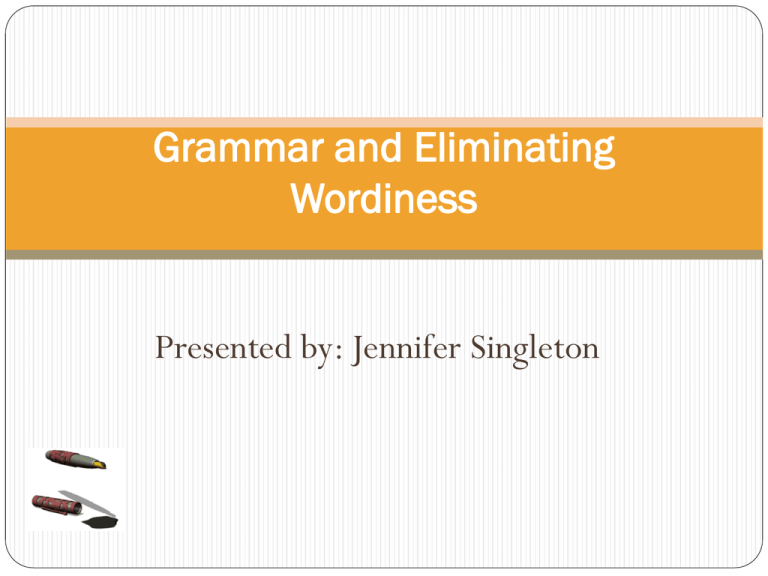
Grammar and Eliminating Wordiness Presented by: Jennifer Singleton How We Read The paomnehil pweor of the hmuan mnid. Aoccdrnig to rscheearch at Cmabrigde Uinervtisy, it deosn’t mttaer in what oredr the ltteers in a wrod are, the olny iprmoetnt tihng is taht the frist and lsat ltteer be at the rghit pclae. The rset can be a total mses and you can still raed it wouthit a porbelm. Tihs is bcuseae the huamn mnid deos not raed ervey lteter by istlef, but the wrod as a wlohe. Amzanig huh? Subject-Verb Agreement 1.Singular indefinite pronoun subjects take singular verbs. Ex: No one wants to eat the last piece of cake. 2. Inverted subjects (when the verb comes before the subject) must agree with the verb. Ex: There are three cars to tow. 3. A phrase or clause between a subject and verb does not change the number of the subject. Ex: A box of nails sits on the counter. Subject-Verb Agreement 4. For compound subjects joined by or/nor, the verb agrees with the subject closer to it. Ex: Neither the buyer nor the sellers are interested in paying the closing cost. 5. Collective nouns may be singular or plural depending on how they behave in the sentence. Ex: The Senate has decided not to convene today. (as a collective unit) Ex: The Senate members have decided not to meet. (as individuals) 6. Compound subjects joined by and are always require a plural verb. Ex: A writer and his pen make an attractive couple. Initialisms and Acronyms: To “the” or not to “the” Know the difference between an initialism and an acronym? Initialisms are abbreviations that can’t be pronounced like words: FBI; acronyms are abbreviations that can: NASDAQ 1. You should use “the” before an abbreviation if the spelled-out word begins with “the.” Example: the People’s Republic of China (PRC). The PRC honored the visiting dignitaries. Initialisms and Acronyms: To “the” or not to “the” 2. When “the” is not a part of the spelled-out name, you should not place it before the abbreviation. Example: Chicago Public Schools. All CPS students are excused from classes this week. 3. Do not place “the” before an acronym. Acronyms are abbreviations that can be pronounced as words, like “NASCAR” and “NATO.” Example: My brother is a huge fan of NASCAR races. Redundancy and Wordiness Many of us believe that a wordy sentence or a sentence that uses academic language (big words) automatically makes said sentence read more eloquently. Not true. The goal is to communicate the message as simply as possible, while keeping in mind the intended audience’s reading level and knowledge of the topic. Redundancy and Wordiness Wordy (alternative) At this particular point in time (now) Made mention of the fact (mentioned) In spite of the fact that (although) Call your attention to (remind you) In this day and age (today) With regards to (regarding) In order to (to) For the simple fact (because) Take into consideration (consider) Redundancy and Wordiness Redundant (alternative) Eliminate altogether Past history Plan in advance /plan ahead Warn in advance Important essentials Follow after First and foremost ATM machine PIN number (eliminate) (past) (plan) (warn) (important or essential) (follow) (first) (ATM) (PIN) Redundancy and Wordiness Smothered Verbs Active verbs are often “smothered” by phrases that begin with a form of be, give, have, make, or take. Be in agreement Be of the opinion Be in receipt of Give consideration Have a requirement Make a determination With the knowledge that With the exception of (agree) (believe) (receive) (consider) (require) (determine) (knowing) (excepting/excluding) Parallelism Parallel sentence structure provides balance and rhythm when you are expressing similar ideas. Words Incorrect : The analyst provides information, will recommend changes, and can assist with technical issues. Parallel: The analyst provides information, recommends changes and assists with technical issues. or Parallel: The analyst provided information, recommended changes and assisted with technical issues. Parallelism Words Incorrect: The committee members read the petition, were discussing its arguments, and the unanimous decision was to ignore it Parallel: The committee members read the petition, discussed its arguments, and decided unanimously to ignore it. Phrases Incorrect: It is easier to report to one executive manager than reporting to all the division heads. Correct: It is easier to report to one executive manager than to report to all the division heads. Parallelism Clauses Incorrect: What we say and the things we do somehow seem out of sync. Correct: What we say and what we do somehow seem out of sync. Correlatives (either/or, neither/nor, not only/but also) Incorrect: He was not only kind, but also knew when to help people. Correct: He was not only kind, but also helpful. Active vs. Passive Voice Verbs whose subjects are acted upon are in the “passive” voice. Active voice (the subject acting) is preferred when possible because it offers more clarity and makes the sentence more concise. 1. It was decided by the commissioner that more decisions should be made by the regional offices of the company. Active: The commissioner decided that the company’s regional offices should make more decisions. 2. Consideration was given to this matter by our executive director. Active: Our executive director considered this matter. Active vs. Passive Voice 3. David Walker was elected chairman by the committee. Active: The committee elected David Walker as chairman. 4. It is the opinion of the division that the equipment is being used in an improper manner by staff. Active: The division believes that staff are improperly using the equipment. 5. The request of the division was given approval by the director. Active: The director approved the division’s request. Which vs. That So what’s the difference? Consider these examples: The files, which are marked “Unclassified,” are stored in the basement. The files that are marked “Unclassified” are stored in the basement. Which vs. That In the first sentence, the word “which” is nonrestrictive. It’s merely adding information about the files. Stating so doesn’t change the meaning because it’s implied that all the files are unclassified. In the second sentence, “that” is restrictive. It implies that there are other files with different classifications, and that these files may be stored elsewhere. Only the unclassified files are stored in the basement in this example. Is it “insure” or “ensure”? “Insure” and “ensure” are examples of homophones, words that sound alike but aren’t spelled the same and have different meanings. capital: chief city complement: to make complete discreet: tactful elicit: draw out insure: to provide insurance stationary: in a fixed location principal: main; important council: assembly; group capitol: legislative building compliment: praise discrete: distinct illicit: illegal; taboo ensure: to take care stationery: paper; letters principle: rule counsel: advice; to advise Punctuation Commas Within a series of three or more words, phrases, figures, etc., use a comma after each item (called a “serial comma”). Ex: DAD Hill requested a new pen, three copies of the report, and a strong cup of coffee. Use a comma after an introductory prepositional or adjectival phrase four or more words in length. Ex: In addition to these figures, the unit will release a full analysis next week. Use a comma to indicate omitted words. Ex: In May the first arrived; in June, the second; in July, the third. Punctuation Semicolons Use a semicolon to separate units of a series when one or more of the units contain commas. Ex: The conference had attendees from Denver, Colorado; Boston, Massachusetts; and Miami, Florida. Use a semicolon before introductory words such as “namely,” “however,” “therefore,” “further,” etc., when they introduce a complete sentence. Ex: The preliminary findings are positive; however, we are worried about the report’s accuracy. Punctuation Hyphens Use a hyphen to avoid “doubling” a vowel when adding a prefix. However, regardless of a double vowel, do not use a hyphen after the prefixes co, de, non, pre, re, and sub. Ex: anti-inflation; semi-independent; cooperation; deemphasize; nonnuclear; preexisting Use a hyphen to join a prefix to an already hyphenated compound. Ex: pre-cease-fire talks Punctuation Colons Use a colon before a final clause that summarizes or expands the topic; and before lists. Ex: We will visit four countries: Spain, Brazil, France, and Canada. Ex: The assistant will perform the following duties: Answer e-mails Attend meetings Draft reports Other Grammar Tips Tip #1: Pronouns must agree in number with the words they refer to. 1. Bathe each dog before they come inside the facility. This sentence is incorrect because “each dog” is singular and “they come” is plural. For a proper agreement, this sentence should read one of two ways: Rewrite: Bathe each dog (singular) before it comes (singular) inside the facility. or Bathe the dogs (plural) before they come (plural) inside the facility. Other Grammar Tips Tip #2: When using apostrophes to show possession, be sure to correctly indicate whether you mean joint possession or singular possession, or both. 1. Melissa and Mike’s books were stolen last week. There is nothing wrong with this sentence if you’re referring to the books that Melissa and Mike owned together. However, if Melissa’s books were stolen and Mike’s books were also stolen, you’d rewrite: Rewrite: Melissa’s (her books) and Mike’s books (his books) were stolen last week. Other Grammar Tips Tip #3: Avoid repetition. Don’t use three or four words when you can use one or two. Original: Each and every one of you will lose if you fail to plan ahead. Rewrite: Each of you will lose if you fail to plan. Original: The perpetrator vandalized 15 stores in the month of February. Rewrite: The perpetrator vandalized 15 stores in February. Original: After I mixed together several cleaning products, I began to feel nauseous. Rewrite: After I mixed several cleaning products, I began to feel nauseous. Other Grammar Tips Tip #4: The subject and verb have to make sense together, meaning the subject has to be able to “do” the verb. Original: The restaurant hopes its new low-calorie sandwich will attract more customers. The restaurant can’t hope, but its owner or manager can. Rewrite: The owner hopes the restaurant’s new low-calorie sandwich will attract more customers. Hands-on Exercises Simplifying sentences handout Punctuation handout References The Chicago Manual of Style, 16th Edition The Only Grammar Book You’ll Ever Need: A One- Stop Source for Every Writing Assignment The Gregg Reference Manual www.PlainLanguage.gov Questions? Question and Answer Wrap-Up


